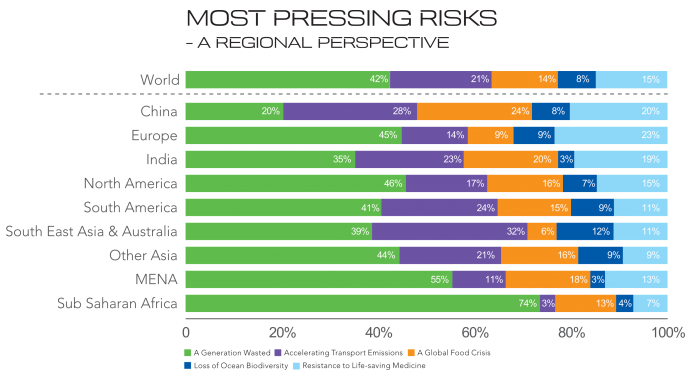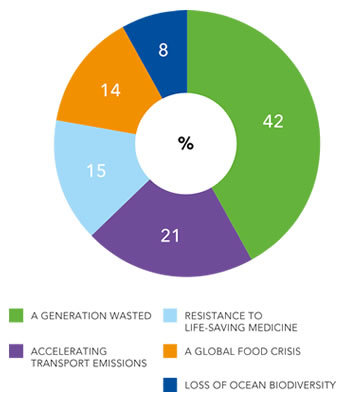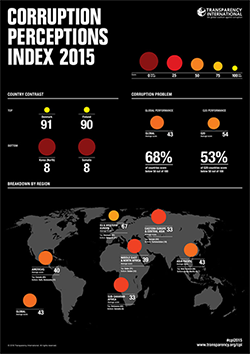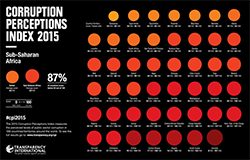You may be there to solve global problems, but attending the annual World Economic Forum Annual Meeting in Davos, Switzerland, generally obliges you to also express remorse for being there in the first place.
Happily, one of the best ways to expiate that sin is bona fide research that may indeed help company leaders solve problems and make decisions — no matter where they’re located or, in some cases, stuck.
The snow-bright Swiss enclave was the perfect place for PwC to release the gloomy results of its 19th annual Global CEO Survey, conducted in late 2015 and receiving responses from 1,409 CEOs in 83 countries.
Among its findings: Two-thirds of CEOs see more threats facing their businesses today than three years ago. Just over a quarter (27 percent) believe global growth will improve over the next 12 months, a decline of 10 points from last year. Just over a third (35 percent) are very confident of their own company growth in the coming year, down four points from last year (39 percent), and one point below 2013.
|
|
2016 | 2015 | 2014 | 2013 |
|---|---|---|---|---|
| India | 64% | 62% | 49% | 63% |
| Spain | 54% | 35% | 23% | 20% |
| Romania | 50% | 44% | 39% | 42% |
| Mexico | 46% | 50% | 51% | 62% |
| Argentina | 42% | 17% | 10% | 25% |
| Africa* | 42% | *** | *** | *** |
| ASEAN** | 38% | 47% | 45% | 40% |
| South Africa | 37% | 39% | 25% | 45% |
| Global | 35% | 39% | 39% | 36% |
| Australia | 35% | 43% | 34% | 30% |
| UK | 33% | 39% | 27% | 22% |
| US | 33% | 46% | 36% | 30% |
| Nordic | 31% | 26% | *** | *** |
| Canada | 31% | 36% | 27% | 42% |
| Denmark | 30% | 33% | 44% | *** |
| Germany | 28% | 35% | 33% | 31% |
| Japan | 28% | 27% | 27% | 18% |
| Russia | 26% | 16% | 53% | 66% |
| China | 24% | 36% | 48% | 40% |
| Brazil | 24% | 30% | 42% | 44% |
| Italy | 24% | 20% | 27% | 21% |
| Taiwan | 19% | 65% | *** | *** |
| Switzerland | 16% | 24% | 42% | 18% |
**The ASEAN countries in which interviews were conducted are: Cambodia, Indonesia, Malaysia, Philippines, Singapore, Thailand and Vietnam
***Not available
North American CEOs are the gloomiest of the bunch, with a level of optimism (16 percent) half that of the most optimistic regions (Western Europe at 33 percent, and the Middle East at 34 percent). “Almost a third of China’s CEOs believe global economic growth will slow down in 2016,” said PwC. “The biggest turnaround is seen in Taiwan, where only 19 percent are very confident of short-term company growth, compared to 65 percent last year — an astonishing slump of 46 points. However, Switzerland has the lowest confidence, with only 16 percent of Swiss CEOs very confident of revenue growth, compared with 24 percent in 2015.”
Confidence in their own businesses’ revenue growth is strongest, however, among CEOs in India (64 percent), Spain (54 percent) and Romania (50 percent).
“Looking at investment prospects, the US, China, Germany and the UK remain the countries CEOs view as most important for growth in the next 12 months,” said PwC. “Mexico and the UAE have also entered the top 10 in place of Indonesia and Australia.”
“The pessimistic outlook for the year ahead is reinforced by the position of the US, China, Germany and the UK as being the most important for growth again,” said Dennis Nally, global chairman of PwC. “The fact that CEOs continue to point to these ‘safe havens’ underlines the general uncertainty about where real growth will come from in the long term.
|
|
2016 | 2015 | 2014 | 2013 |
|---|---|---|---|---|
| Technology | 67% | 55% | 63% | 44% |
| Asset Management | 65% | 61% | 58% | 55% |
| Pharmaceuticals & Life Sciences | 64% | 58% | 44% | 38% |
| Healthcare | 56% | 59% | 53% | 43% |
| Hospitality & Leisure | 53% | 45% | 51% | 33% |
| Business services | 51% | 56% | 62% | 56% |
| Retail | 51% | 46% | 51% | 49% |
| Transport & Logistics | 51% | 49% | 40% | 43% |
| Insurance | 49% | 50% | 59% | 39% |
| Automotive | 48% | 49% | 45% | 44% |
| Communications | 48% | 40% | 52% | 36% |
| Industrial Manufacturing | 47% | 53% | 46% | 36% |
| Chemicals | 46% | 50% | 49% | 43% |
| Mining | 45% | 52% | 25% | 39% |
| Banking & Capital Markets | 43% | 53% | 52% | 44% |
| Engineering & Construction | 42% | 51% | 51% | 52% |
| Power & Utilities | 42% | 36% | 36% | 41% |
| Consumer Goods | 41% | 40% | 46% | 40% |
| Entertainment & Media | 39% | 46% | 53% | 43% |
| Forest, Paper & Packaging | 36% | 27% | 45% | 32% |
| Metals | 32% | 41% | 22% | 28% |
“No matter what the business size, the threats it faces are becoming more complex, crossing the borders of geopolitics, regulation, cybersecurity, societal development, people, and reputation,” Nally said. “There is a new spectrum of risk for CEOs that represents threats to both national and commercial interests.”
The top risk is not new, however: 79 percent of CEOs cited over-regulation as their top threat — “the fourth year in a row that concerns about regulation have risen,” said PwC. Geopolitical uncertainty was second (74 percent), followed by exchange rate volatility (73 percent) and key skills availability (72 percent). Several sectors have particularly high levels of skills concern, topped by entertainment and media, and technology, “while sectors more traditionally aligned with ‘STEM’ skills including manufacturing, pharmaceuticals and life sciences, also feature,” says the report.
“Geographically, workforce skills concerns are highest in Asia Pacific (81 percent), the Middle East (83 percent) and Africa (86 percent), and lowest in Western Europe (59 percent).”
Even with those concerns, however, nearly half (48 percent) of CEOs plan to increase their headcount over the next 12 months. “Business recruitment activity is highest in India (70 percent), the UK (66 percent) and China (57 percent),” says the report.
The top priority for government should be a clear and effective tax system, say 56 percent of CEOs, followed by a skilled, educated and adaptable workforce (53 percent), and infrastructure (50 percent) — both physical and digital. Two thirds (67 percent) cite a stable tax system as being more important than low tax rates.
Solutions at Hand
One week after the PwC report’s release, the 2016 Global Opportunity Report was released by Norway’s DNV GL, the United Nations Global Compact and Monday Morning Global Institute. Based on a survey of 5,567 business, governmental and social leaders across five continents, the report finds 42 percent of the leaders consulted rate youth unemployment as today’s most pressing global risk, yet 83 percent they see the greatest business potential in getting youth in to work.
The report seeks to complement the WEF’s Global Risk Report by showing the opportunity landscape beyond risks. “This year, risks such as ‘loss of ocean biodiversity,’ ‘accelerating transport emissions,’ ‘resistance to life-saving medicine,’ ‘youth unemployment’ and ‘global food crisis’ were transformed into 15 opportunities,” says the report.

Leaders from both the public and private sector see ‘smart farming’ as the number one opportunity. “Globally, civil society can be expected to fight hardest for changes to the current food system,” says the report. “The survey shows that the top three issues for civil society out of the 15 opportunities are all related to how we produce food. At the top of the advocacy agenda of civil society is food waste reduction, followed by a transition to smart farming and then antibiotic-free food production.”
Global Opportunity Report

The promise of smart farming is followed by possibilities in the digital labor market. And sewn into all opportunities is technology.
“These are not future technologies — these are technologies already available to us, right now — but scaling is needed,” said DNV GL Group President and CEO Remi Eriksen, who also noted the need for cross-industry collaboration. “A good example is one of this year’s opportunities, ‘Smart Ocean.’ By the use of existing sensor technology and ocean traffic monitoring systems, we can observe the state of the world ocean to learn more about the marine ecosystems and utilize the opportunities it offers in a sustainable manner. With proper implementation and scaling this solution could have massive impact.”
Youths between 15 and 24 are three times more likely to be unemployed than adults. Globally, around 75 million youth are looking for work.
When appointed last spring to his post, Eriksen saw his own company as a place for such modeling to occur.
“I believe the future will be characterized by a very complex and fast-changing world and a period of slower global growth,” he said then. “However, the world economy is still on track to more than double in size over the next 40 years. I see a future where trusted independent parties are increasingly needed to enable safe and responsible business performance and sustainable value chains.”

Across all 15 opportunities surveyed, women are more positive than men. “This year’s ‘opportunity manager’ is an Asian female leader under age 30. She works in the service or manufacturing sector,” the report pronounced. “Chinese respondents in general stand out from all other regions with a consistently positive outlook both on the ability of the region to make systemic change happen and the positive benefits to society of these changes. Chinese women are the most positive of the survey respondents.” Meanwhile, South America is the region “with the largest gap between its belief in positive change arising from the opportunities, and its capacity to pursue opportunities.”
Three of the nine regions rank smart farming as their favorite opportunity: North America, Sub-Saharan Africa, and India. For South America and Other Asia the No. 1 opportunity is the digital labor market. Europe and South Asia & Australia favor opportunities to address the risk of a generation wasted.
See-Through Standards
Last but not least comes the 2015 edition of Transparency International’s Corruption Perceptions Index. Not one of the 168 countries assessed gets a perfect score, and two-thirds score below 50, on a scale from 0 (highly corrupt) to 100 (very clean). For companies examining their own transparency and social responsibility policies, the CPI may offer multiple indicators: Where to conduct business, where not to conduct business, and where to keep a close eye on what your own global colleagues are up to while they’re doing business.
Overall, two-thirds of the 168 countries on the 2015 index scored below 50, on a scale from 0 (perceived to be highly corrupt) to 100 (perceived to be very clean). Denmark took the top spot for the second year running, with North Korea and Somalia the worst performers, scoring just 8 points each.
“Top performers share key characteristics: high levels of press freedom; access to budget information so the public knows where money comes from and how it is spent; high levels of integrity among people in power; and judiciaries that don’t differentiate between rich and poor, and that are truly independent from other parts of government,” said the report. “In addition to conflict and war, poor governance, weak public institutions like police and the judiciary, and a lack of independence in the media characterize the lowest ranked countries.”
The big decliners in the past four years include Libya, Australia, Brazil, Spain and Turkey. The biggest improvers include Greece, Senegal and the UK, with strong citizen actions against corruption in Guatemala, Sri Lanka and Ghana also improving those nations’ scores. “Brazil was the biggest decliner in the index, falling five points and dropping seven positions to a rank of 76,” said the report, just six months until the Olympic Games touch down in that nation. “The unfolding Petrobras scandal brought people into the streets in 2015, and the start of judicial process may help Brazil stop corruption.”
“Many countries low down the index have ample natural resources — take Argentina, Mexico or oil-rich Venezuela, the region’s lowest scorer — yet longstanding corruption has led to a desperate lack of investment in security, education and health. Until these weaknesses are addressed, corruption will continue to be the norm and citizens’ quality of life will not improve.”
“Nordic countries score highly again — with Denmark, Finland, Sweden coming top three, and Norway not far behind. Yet we’ve seen big corruption cases in all four in 2015 … In low-scorers Hungary, Poland and Turkey (which has plummeted in recent years along with Spain) politicians and their cronies are increasingly hijacking state institutions to shore up power, a worrying trend also affecting the Balkans.”
“This year’s index presents a worrying picture, with 40 of 46 countries showing a serious corruption problem and no improvement for continent powerhouses Nigeria and South Africa. Indicators for rule of law and justice score particularly badly. While some governments are reducing risks for business, there’s little change for citizens — as systemic corruption leaves many countries struggling to uphold basic rule of law. If corruption and impunity are to ‘be a thing of the past’ as boldly stated by the African Union in Agenda 2063, ‘The Africa We Want,’ governments need to take bold steps to ensure rule of law is the reality for everyone.”
“The 2015 Corruption Perceptions Index clearly shows that corruption remains a blight around the world,” said José Ugaz, the Peru-based chair of Transparency International. “But 2015 was also a year when people again took to the streets to protest corruption. People across the globe sent a strong signal to those in power: it is time to tackle grand corruption.”
More than 6 billion people live in a country with a serious corruption problem.
Grand corruption is the abuse of high-level power that benefits the few at the expense of the many, and causes serious and widespread harm to individuals and society. It often goes unpunished. This year Transparency International is calling on all people to take action by voting at unmaskthecorrupt.org. “We want to know which cases the public most believe merit urgent attention to send a message that we will take a stand against grand corruption,” says the organization.
Grand stands are part and parcel when it comes to the World Economic Forum and its Davos confab. Now comes the part after the stages and podiums have been packed away.




